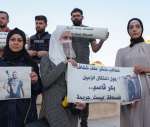You are here
The US needs to say ‘no’ to Israel and ‘yes’ to Palestine
Dec 12,2023 - Last updated at Dec 12,2023
The Biden administration has recently attempted to pivot from its initial unconditional support for Israeli actions in Gaza by combining caution with a vague plan for “the day after”.
Immediately after October 7, President Biden offered the Netanyahu government exaggerated support of its right to defend itself, its goal of eliminating Hamas, and his pledge unwavering US support. This response to what had just occurred may have been understandable, but Israel clearly viewed Biden’s words as a green light to exact a punishing toll on the Palestinian people as a whole.
As the staggering death toll grew, and Americans witnessed the horrific damage and scenes of over one million Palestinians walking miles seeking safety, the White House shifted slightly. They cautioned Israel to be “more strategic” in bombing raids to lessen civilian risk. Without adding, “if you continue, we’ll...” these warnings were viewed in Israel as toothless.
As US polls showed growing disapproval for Israeli actions and the administration’s timid response, coupled with signs of increasing Arab World dissatisfaction with America’s refusal to rein in Israel, the administration went further. Key White House talking points included: urging Israel to adhere to the “rules of war” limiting civilian casualties, warnings that the US would not accept Gaza’s reoccupation, and insistence on increased humanitarian assistance.
This slight change in tune had no corresponding shift in policy. The Administration refused to place conditions on future US military aid to Israel or discourage Israel from resuming its war.
Then the White House, concerned with the lack of an “end game”, offered a few ideas, though nothing “new” nor especially serious. They called for a “reconstituted Palestinian Authority” to administer Gaza, leading to recognition of the West Bank and Gaza as one entity constituting the future Palestinian state, and for Israel to control settler violence in the West Bank.
Two months in, with 15,000 Palestinians killed, 1.7 million displaced, and one-half of Gaza’s structures demolished, several questions come to mind. How will renewed bombings not take more civilian lives? With many Hamas leaders and operatives having gone to an overly congested south, how can Israel eliminate Hamas without creating more deaths? How can the Palestinian Authority (PA) be reconstituted while Palestinians are living under occupation?
Before the war Hamas’ popularity was low; polls now show surging support and the PA losing even more legitimacy. An election under these conditions is almost guaranteed to produce a result that Israelis and the US will never accept.
Although many ideas from Washington envision the Netanyahu government being replaced by a new coalition, no possible reconfiguration of the existing Knesset nor a new election will produce a government able to pursue significantly different policies regarding Palestinians. They would not guarantee anything close to an independent Palestinian state, nor rein in settlers or limit settlement expansion.
Two words would reverse this downward spiral. The first is “No”. Instead of “rules of war” reminders or asking for limiting civilian casualties, settlement expansion, or settler violence, the president should just say “No”. No more offensive military equipment or US support in international fora without a permanent ceasefire, action to disarm violent settlers, and ending all settlement expansion.
A serious path forward to a peaceful resolution requires dramatic surgery to remove the cancer provoking violence and creating radicalisation on all sides. “No” to continued occupation.
Then change the US “no” at the United Nations to “yes” and support a Security Council resolution recognising Palestine as a state, declaring continued occupation as a threat to regional peace and security, and ordering an empowered UN peacekeeping force to provide peace and security for Israelis and Palestinians.
Such US moves would undoubtedly shock both societies. Only under the security provided by this UN mandate could Palestinians put their house in order. And changing the status of territories to Palestinian land would leave Israelis asking hard questions about where decades of unchecked acquisitiveness and expansion have led them and reexamining continued oppression of Palestinians with impunity. In the aftershock, sane voices would break through, reigniting Israeli peace forces and Palestinian moderates. It will not be easy, but leaving the cancer in place is a prescription for certain death. A shock to the system is required and begins with a US “no” followed by “yes”.
The writer is president of the Washington-based Arab American Institute














Add new comment